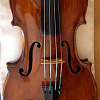We have thousands of human-written stories, discussions, interviews and reviews from today through the past 20+ years. Find them here:

December 2010
V.com weekend vote: What part of your practice do you most enjoy?
December 17, 2010 11:14
What part of your practice do you most enjoy?
Simon Fischer has an entire book on the subject, Practice, and he categorizes different types: exercises, scales, studies and pieces. I would further divide "pieces" into new pieces and review pieces, as Shinichi Suzuki encouraged "review" as one of the main roads to mastery.
If I were to guess, I might think that people would enjoy playing the music they already know, but observing how many of my students resist review, this cannot be so. Why do we work like crazy on a piece, then neglect it and allow it to go swirling down the toilet? Keeping up old pieces has a great reward: mastery. Shinichi Suzuki correctly preached that repetition leads to mastery -- particularly mindful repetition that aims to improve with every play-through. The beginner who keeps up every piece enjoys pretty smooth sailing. Likewise, to really know a concerto, play it every day -- for about a year!
But a new piece has great allure, for many reasons. It's the piece you want to play, the new page in the book! Figuring it out can be a lot of fun. I enjoy a good breakthrough when I find the fingering that really works, when pieces of the puzzle come together and the picture starts getting clearer.
At the same time, I find peace in playing a nice, long scale routine. Maybe peace isn't the right word, maybe it's "calm." Fingers move faster when calm; firing muscles at full force causes tension and slows them down. Playing scales every day puts the fingers at ease, calmly falling into all the correct slots. I love scales. I may just vote for scales, but I'm not telling.
Because I just may vote for etudes. I played etudes, or "studies," more as a student than I do now, but I liked having something that worked on technique in a clever way. If you go through an etude book that is at the right level for you, you will inevitably advance your technique, without having to invent every exercise yourself. Sometimes, when playing etudes, I can almost feel the presence of the teacher who wrote it. "Mr. Dont, I see that you intend to take me through every possible permutation here of a double-stop string crossing, but we wouldn't do this in real life or real music, right?" It's not music exactly, but it has a certain humor, a certain personality, that is absent in a straightforward scale or exercise.
Not that exercises are bad, one could vote for them as well, such as the ones in Basics, or exercises inspired by Suzuki teachers. Vibrato exercises, bow-hand flexibility exercises, shifting exercises, arm exercises, etc.
What is the part of your practice that you most enjoy? Please vote and then explain, and also explain if you have another part of practice that I've left out.
V.com weekend vote: Has playing the violin ever caused you physical pain?
December 11, 2010 20:10
Is playing the violin a big pain in the neck for you?
It has been, at different points, for me. For a while I had neck problems, and I had to start doing a series of neck exercises to keep from seizing up. Then, I also had some over-use issues, as I write with my left hand and had a job that involved taking a lot of notes. For that, I simply had to stop playing (and writing and typing) for two weeks.
My back certainly gets very tight, especially on the right side. Yoga helps this greatly. In fact, yoga has pretty much kept me from being injured for a very long time.
How about you? Has the fiddle ever caused you pain, and how did you cope?
V.com weekend vote: Which would you want as your violin, a Strad or a well-made copy of a Strad?
December 4, 2010 12:22
People often debate the merits of a modern violin vs. an old Italian masterpiece, such as a Stradivari violin. Certainly, masterpieces are being created here and now, right under our noses, by luthiers all over the world. But the old ones have proven themselves.
Putting aside the considerable barriers such as cost and access to such instruments, which would you prefer to have as your primary instrument, given the choice? Arguments point in both directions, and I will give you at least a few of them: a Strad is an object of great beauty, and with so much music having been through that old wood, it tends to respond in fascinating ways. It as a history, it has passed through time and through human hands. At the same time, such instruments can be fussy about the weather and extremely difficult to play because they require so much sensitivity and the ability to adjust to them.
For our purposes, the new instrument that we are talking about is made by a master luthier, using the finest wood. It also is an object of great beauty. It doesn't have a history, but you can be the one to make the first pass at molding its sound. It won't be so fussy, but it also won't have quite the range of overtones as its much-older relative.
Given the choice of which one you would want to live with every day? With barriers to access lifted, which would you choose? And of course, I know that many people would choose neither, preferring a different kind of violin, or something that's not a copy, but this is just for the sake of argument and as a starting point for conversation, so I welcome your comments.
More entries: November 2010











